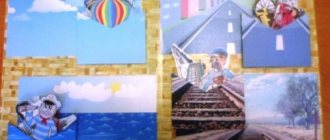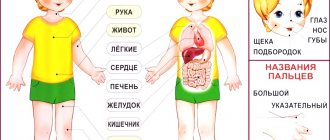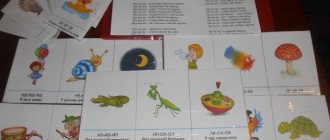Word games are a real salvation for parents. They can keep your child occupied in line, on the train, in the car, on the way to the metro... In short, when you need to pass the time, but there is nothing at hand. Or everything is there, but it has become boring.
Word games are very useful - they develop speech, memory, imagination, thinking, enrich vocabulary, and train phonemic hearing. And they're just fun to play! With the right word game, time flies.
This collection contains 14 games, arranged in increasing difficulty.
"I see something..."
The driver makes a wish for an object that is in the players’ field of vision: “I see something...” and names the color, shape, first letter of the word, etc. Players must guess the item.
The game is remarkable because it can be played with kids, making something very simple, and with older children. If you see that the child can cope easily, you can limit it to two or three attempts.
Example: “I see something green...” Players go through the options - a car, leaves on a tree, etc.
“I see something round...” (glasses on a person, road sign, traffic light, etc.)
Games with words for children 2-3 years old
At this age, an adult should talk to the child as much as possible and encourage the baby to speak in any situation. For the development of a two to three year old child, nursery rhymes that have long been known to the Russian people are perfect - “Ladushki”, “Horned Goat”, “Magpie-Crow” and many others.
When getting acquainted with a poetic text, it would be better if an adult sits the baby in front of him and begins to pronounce the words of the rhyme and perform the movements described in it. Then you need to involve the baby in the game, perform movements with his hands in parallel with pronouncing words to adults.
Usually children quickly remember the words of nursery rhymes and movements. An adult can also pick up the child. When the words of the poem sound, the baby will begin to independently perform the necessary movements. After the entire algorithm has been mastered, let the baby recite the nursery rhyme together with the adult, and then independently.
These verbal exercises train the ability to memorize and reproduce poetic texts, and also develop the abilities of a little person:
- listen and understand the speech of adults;
- correlate your movements with the words of nursery rhymes;
- answer adult questions
Let grandparents remember all those short nursery rhymes that their grandparents told. These poems are perfect for the speech development of modern children.
4. "Words"
The first player says a word, the second player says a word starting with the last letter of the previous word.
Example: Shirt – Archaeologist – City – House, etc.
A more difficult option: come up with words starting with the last two letters of the previous word.
Example: TelnyashKA – KayuTA – Taxi – Syrup, etc.
Attention! In the complicated version, there may be words whose last two letters do not allow forming a word (for example, “foreigner”, “character”). If all players agree that a new word cannot be formed from the last two letters, then in this case the last letter is taken for word formation, as in the usual version of the game.
8. "Poker"
This fun word game is especially popular with kids. Ask the children to make a wish for any piece of furniture (chair, armchair, etc.) or kitchen utensil (fork, poker, rolling pin, etc.).
Then the driver asks the players various questions, which must be answered only with the hidden word.
Example: What is your name? - Poker.
What did you have for breakfast today? - Poker.
What gift did you receive for your birthday? - Poker.
Another version of the game: players think of words for each other, which they will then use to answer the driver.
Complication: You can't laugh.
“I’m going on a hike and taking with me...”
The driver says the first phrase: “I’m going on a hike and taking with me...” Then he adds any word that suits the meaning. The next player repeats the phrase and adds a word of his own.
The game continues until the players are able to repeat the entire phrase.
Example: “I’m going on a hike and taking with me... a bowler hat.”
“I go camping and take a bowler hat and matches with me.”
“I’m going on a hike and take a pot, matches and a knife with me,” etc.
By the way, the first phrase can be not only about the hike. For example: “I go to the store and buy there...”, “I go to visit and take with me...”, etc.
“Verbal games for children 6-7 years old” card index for speech development (preparatory group) on the topic
Word games 6 – 7 years old A.K. Bondarenko Word games 6 – 7 years old A.K. Bondarenko
"Answer quickly"
Purpose of the game. Strengthen children's ability to classify objects (by color, shape, quality), teach them to think quickly and answer.
Progress of the game.
The teacher, holding a ball in his hands, stands in a circle with the children and explains the rules of the game: “Now I will name a color and throw the ball to one of you. The one who catches the ball must name an object of this color, then he himself names any color and throws the ball to the next one. He also catches the ball, names the object, his color, etc.
“Green,” says the teacher (takes a short pause, giving the children the opportunity to remember green objects) and throws the ball to Valya. “Leaf,” answers Valya and, saying “blue,” throws the ball to Vita. “The sky,” Vitya answers and says “yellow,” throwing the ball to the next one. The same color can be repeated several times, since there are many objects of the same color.
The main feature for classification may not be the color, but the quality of the item. The beginner says, for example: “Wooden,” and throws the ball. "Table", -
The child who caught the ball answers and offers his word: “Stone.” “House,” answers the next player and says: “Steel.” - "Spoon". Etc.
Next time, the main feature is the form. The teacher says the word “round” and throws the ball to anyone playing. “Sun,” he replies and names another shape, for example “square,” throwing the ball to the next player. He names a square-shaped object (window, book, scarf) and suggests some form. The same shape can be repeated several times, since many objects have the same shape.
When repeated, the game can be complicated by offering to name not one, but two or more objects.
“Who can name more actions?”
Purpose of the game. Teach children to relate people’s actions to their profession, activate their vocabulary, and develop the ability to think quickly.
Progress of the game.
Before the game, the teacher conducts a short conversation, clarifying the children’s understanding of the words “profession” and “actions”: “Children, I work as a teacher in a kindergarten. This is my profession. Tolina’s mother treats the sick. Her profession is called "doctor". What do you think is the profession of Antonina Vasilievna, who cooks dinner for us? (Children answer: “Cook.”) Name what professions you know. (Children call: “Driver, teacher, shoemaker, pilot, etc.”) Every person, having a profession, works and performs some actions. What does a cook do? (Children answer: “Cooks, bakes, fries, grinds meat, peels vegetables, etc.”) Now we will play with you the game “Who can name the most actions?” I will name a profession, and you will remember all the actions of a person in this profession.”
The teacher says the word “doctor”. The children answer: “Examines patients, listens, treats, gives medicine, gives injections, operations.” “Tailor” - bastes, cuts, flogs, irons, tries on, sews, etc.
The teacher names professions familiar to the children: janitor, nanny, laundress, driver, etc. Children remember what people in these professions do.
Whoever names the most actions is considered the winner.
"Not really"
Purpose of the game. Teach children to think, pose questions logically, and make correct conclusions.
Progress of the game.
Option 1. The teacher tells the children the rules of the game and explains the name. “Why is this game called that? Because you and I can only answer the driver’s questions with the words “yes” or “no.” The driver will go out the door, and we will agree on what object in our room we will wish for him. He will come and ask us where the item is, what it is, and what it is needed for. We will answer him with only two words. First, I will be the driver. When I leave the room, Vova will tell you what object he proposes to wish for. Then you will call me.
The teacher leaves, then enters the room and asks: “Is this object on the floor?” - "No". “On the wall?” - “No.” "On the ceiling?" - "Yes". "Glass? Does it look like a pear?” - "Yes". "Bulb?" - "Yes".
Taking on the role of the first leader, the teacher teaches children to ask questions logically. He explains: “Children, did you notice how I asked? First I found out where the object was, and then I found out what it was. Try to guess the same.”
This game teaches children to think logically: if an object is not on the floor, then it can be on the wall or ceiling. Children do not immediately draw the right conclusions. It happens like this: having learned that this object is not on the floor, the child continues to ask: “Table?”, “Chair?” In such cases, the teacher helps the child come to the correct conclusion: “Ira, we told you that the object is not on the floor. Where is the chair, the table?” - "On the floor". “Should I have named them?” - "No". “You found out that the object is on the wall. Look at the objects on the wall and guess what we wished for,” the teacher suggests. “Is it square?” - “Yes.” “Framed?” - "Yes". “Does it have flowers on it?” - "Yes". "Painting?" - "Yes".
Option 2. It is better to offer a more complex option. The teacher makes a guess for an object that is located outside the room: “Children, there are a lot of objects, and it will be difficult to guess if you don’t know whether it is on earth or in the sky, in the house or on the street, whether it is an animal or a plant.”
If children have played this game several times, they quickly begin to select questions and guess the intended object. For example, the children wished for the sun. Misha the guesser asks the following questions: “In the house? On the street? In the garden? In the forest? On the ground? In the sky?" Upon learning that the object is in the sky, 011 asks the following questions: “Air? Clouds? Snow? Sparrows? Rocket? Airplane? Sun?"
Based on his questions, one can trace the course of logical thinking: having learned that an object is in the sky, he names only those objects that can be there.
“Who will notice more fables?”
Purpose of the game. Teach children to notice fables, illogical situations, and explain them; develop the ability to distinguish the real from the imagined.
Progress of the game.
Children sit down so that they can put chips on the table. The teacher explains the rules of the game: “Children, now I will read you Korney Chukovsky’s poem “Confusion”1. There will be many fables in it. Try to notice and remember them. Whoever notices a fable by placing a chip will notice another fable - put a second chip next to it, etc. Whoever notices more fables will win. You can put down the chip only when you yourself have noticed the fable.”
First, a small part of this poem is read. The poem is read slowly, expressively, places with fables are emphasized. After reading, the teacher asks the children why the poem is called “Confusion.” Then the one who put aside fewer chips is asked to name the fables he noticed. Children who have more chips name those fables that the first responder did not notice. You cannot repeat what has been said. If the child has placed more chips than fables in the poem, the teacher tells him that he did not follow the rules of the game and asks him to be more attentive next time. Then the next part of the poem is read. It is necessary to ensure that children do not get tired, since the game requires a lot of mental effort. Having noticed from the children’s behavior that they are tired, the teacher must stop playing. At the end of the game, you should praise those children who noticed more fables and explained them correctly.
“What does anyone need?”
Purpose of the game. Exercise children in the classification of objects, the ability to name objects necessary for people of a certain profession.
Progress of the game.
The teacher reminds the children of the game “Who can name the most actions?” He says: “In this game you named what actions a person of a particular profession performs. And today we will remember what people of different professions need to work. I will call the person by profession, and you will tell me what he needs for his job.” "Shoemaker!" - says the teacher. “Nails, a hammer, leather, boots, boots, a car, a paw,” the children answer.
The teacher names professions familiar to the children of this group: doctor, nurse, teacher, nanny, janitor, driver, pilot, cook, etc.
If children do not lose interest in the game, you can offer the opposite option. The teacher names objects for the work of people of a certain profession, and the children name the profession.
“He reads, talks, teaches how to draw, sculpt, dances and sings, plays,” says the teacher and throws the ball to one of the players. “Teacher,” he answers and throws the ball to her.
In this game, as in other games where the rules provide for the ability to respond quickly, it is necessary to remember the individual characteristics of children. There are slow children. They need to be taught to think faster, but this should be done carefully. It is better to call such a child to answer first, since at the beginning of the game there is a large selection of words. The teacher encourages the child with the words: “Vitya quickly found the right word. Well done!" It is the speed of response that is emphasized.
"Hunter"
Purpose of the game. Exercise children in the ability to classify and name animals, fish, birds, etc.
Progress of the game.
Somewhere in a free space at one end of the yard or area there is a group of people playing. This is home. At a distance of several steps from the house - the farther the better - some kind of mark is placed and a line is drawn. This is a forest where different animals live. The hunter, one of the players, goes to this forest. Standing still, he says the following words: “I’m going into the forest to hunt, I will hunt for...” Here he takes a step forward and says: “... a hare”; takes the second step: “...by the bear”; takes the third step: “...like a wolf”; fourth step: “...fox”; fifth: “...a badger...”. With each step the hunter names an animal. You cannot name the same beast twice. You can’t name birds either, but if you play bird hunt, you only need to name birds.
The winner is the one who reaches the forest, naming a new animal with each step. The one who could not do this returns home, and the next one goes hunting. The unsuccessful hunter may be allowed to go hunting again. Perhaps this time the hunt will be successful.
Note. Based on the principle of this game, you can play the game “Fisherman”. The game is played the same way. The fisherman says: “I’ll go fishing and catch... pike, crucian carp, perch,” etc.
"Come up with a proposal"
Purpose of the game. To develop speech activity and quick thinking in children.
Progress of the game.
Children and teacher sit in a circle. The teacher explains the rules of the game: “Today we will come up with sentences. I will say a word, and you will quickly come up with a sentence with this word. For example, I will say the word “close” and give Misha a pebble. He will take a pebble and quickly answer: “I live close to the kindergarten.” Then he will say his word and pass the pebble to the person sitting next to him.” The word in a sentence must be used in the form in which the person guessing suggests it. So, in turn (in a circle), the pebble passes from one player to another. If children find it difficult to answer, the teacher helps them. This game is played after children have become familiar with the word and sentence.
"Say it differently"
Purpose of the game. Teach children to choose a synonym - a word that is close in meaning.
Progress of the game.
The teacher says that in this game the children will have to remember words that are similar in meaning to the word that he names.
“Big,” the teacher suggests. Children name words; “Huge, large, enormous, gigantic.”
“Beautiful” - “Pretty, good, beautiful, charming, wonderful.”
“Wet” - “Damp, damp.” Etc. When preparing for the game, the teacher selects words in advance that have a number of synonyms. It is better to write down these words so as not to remember them for a long time, since the game takes place at a fast pace.
The teacher can, by analogy with this game, develop other games, for example: he names some noun, and the children select suitable epithets for it. So, for the word “sea,” children select the epithets “calm, stormy, quiet, azure, menacing, stormy, beautiful, southern.” The child who remembers more words should be praised.
All these games can be played during a lesson in your native language (as part of the lesson).
"Choose a word"
Purpose of the game. To develop children's intelligence and the ability to select words that have the right meaning.
Progress of the game.
The teacher, addressing the children, asks them questions, for example: “Remember what you can sew.” Children's answers. “Dress, coat, sundress, shirt, boots, fur coat, etc.” “Darn?”—“Socks, stockings, mittens, scarf.” “Should I tie it?” - “Shoelaces, string, scarf, ties.” “Pull up?”—“Hat, scarf, hat, Panama hat, peakless cap, cap, Budenovka.” “Should I wear it?”—“Coat, dress, stockings, fur coat, raincoat, skirt, sundress, tights.”
The teacher names the words he has previously planned. Children give answers by choosing words that match their meaning.
"Make no mistake"
Purpose of the game. Develop quick thinking, consolidate children's knowledge of what they do at different times of the day.
Progress of the game.
The teacher conducts a conversation with the children, consolidating their knowledge about different parts of the day. Children remember what they do in the morning, afternoon, evening, and night. Then the teacher offers a game: “Children, now let’s play with you like this. I will name one word, part of the day, and you will remember what you are doing at that time. For example, I will say the word “morning”. What do you call it? Children remember: “We wake up, say hello, wash, brush our teeth, comb our hair,” etc. “That’s right,” says the teacher. - But during the game, only the one to whom I place the cube will answer, and only one action can be named (“I’m going to kindergarten” or “doing gymnastics” or “working out”); The person who calls passes the cube to another player. If someone does not remember and does not say anything, he must hit the cube on the table and pass it on. Then he is considered a loser. Be careful, don’t make a mistake!”
The teacher names different parts of the day, the children answer.
The same game can be played differently. The teacher names various actions of the children, and they must answer with only one word: day, morning, night, evening. For example, the teacher says: “I’m having breakfast,” and puts a cube to the player. He quickly answers: “In the morning.” Teacher: “I’m watching TV.” Children can name two words: “Day”, “Evening”.
"Kuzovok"
Purpose of the game. Develop auditory attention; activate vocabulary, thinking; develop intelligence.
Progress of the game.
The presenter shows the “box” and says: “This is a magic box, we will put all the words that end in “-OK” there, I’ll put a bag of apples in the box, and what will you put in the box?” Next, the “body” is passed around the circle and each player names a word ending in -ok; if the word is named correctly, the player takes a chip for himself. The one who collects the most chips wins.
“Only this letter.”
Purpose of the game: To consolidate children’s knowledge of letters and sounds; cultivate auditory attention and speed of reaction to words.
Progress of the game.
Everyone chooses one of the letters - A, B, C, D, D and so on. When everyone has their own letter, the teacher turns to one of the players and asks: “What is your letter?” - A. And for all the following questions, this player can select answers only to the letter “A”. You need to choose quickly, without hesitation.
The teacher asks: - What is your name? - Andrey. - What is your last name? - Azbukin. - Where did you come from? — From Arkhangelsk. - Where are you driving? - To Astrakhan. —What will you go there with? - By bus. - What grows there? - Watermelons. - And what else? - Apricots. — What kind of birds are there? - Storks. - What animals? - Argali. - Who will meet you at home? - Alyosha. - What will you bring him as a gift? — An album (or a diamond, or an aquarium, or an atlas, or anything else, but it must be A).
Then the teacher turns to another letter and asks it similar questions. -What is your letter?
It also happens that the one who must name all the words starting with the letter “A”, when asked: “What is your name?” - will say his own name: Sasha or Natasha, or will make a mistake in the name of the city, the country where he is going, or a tree, flower, bird. Then all the players stomp their feet or snap their fingers three times.
And when they hear the correct answer, they quickly clap their hands three times. Well, what should you do if a letter is wrong a second time? Then this letter is forced to do something: either jump around the table on one leg, or sit under the table and shout “crow” three times, or put a paper cap on its head and sit in this cap until the other one makes a mistake: then the cap put on that one. They play until all the letters answer.





